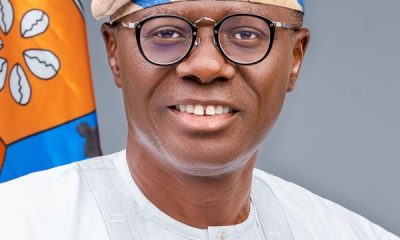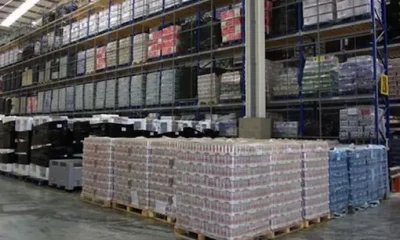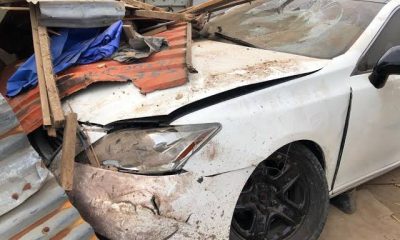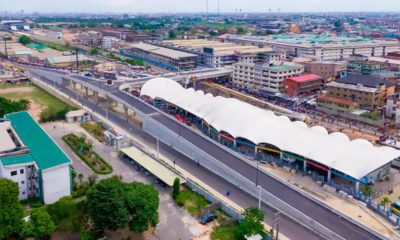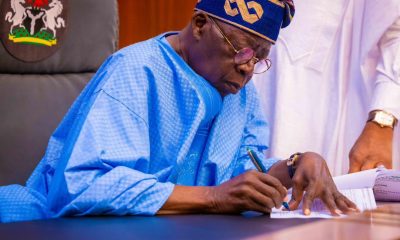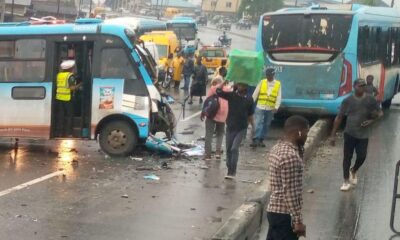News
BoI, LASG move to improve manufacturers’ financial prospects under AfCFTA

Lagos State Government and Bank of Industry (BoI) have urged manufacturers to embrace the various available financing options, aimed at driving the sector’s competitiveness under the African Continental Free Trade Area (AfCFTA).
They gave the charge at the 52nd Annual General Meeting (AGM) of the Manufacturers Association of Nigeria (MAN) Apapa Branch, Lagos on Tuesday.
The AGM has the theme: “Financing Nigeria’s Manufacturing Sector for Economic Growth”.
Mr Olukayode Pitan, Managing Director, BoI, said that seamless access to finance was imperative to sustain the manufacturing sector, considering its contribution to the economic diversification drive of the nation.
Pitan, represented by Dr Isa Omagu, General Manager, Large Enterprises, BoI, said the bank was poised to support manufacturers and committed to providing financing solutions to sustainable businesses.
He urged manufacturers to improve their ability to have access to finance for competitive advantage by keeping their businesses in order, adopting digital solutions to improve processes and avoiding fraudulent business ideas.
He listed some of the lingering problems affecting productivity in the manufacturing sector to include inability to access finance, infrastructural deficiencies, high energy costs and high lending rates, among others.
Pitan noted that accessing finance remained a major challenge facing manufacturers due to poor stock keeping practices, lack of credit history, structure and collateral.
He said the best financing options for Nigeria manufacturers to compete effectively under AfCFTA remained through Development Financial Institutions (DFIs) interventions such as BoI, African Export Import Bank (AFREXIM) among others.
He added that the bank had developed products to provide equipment financing and working capital Micro, Small and Medium Enterprises (MSME) in target sectors at less than 10 per cent interest rate per annum.
“Financing is a key consideration for Nigerian manufacturers to ensure business survival and profitability as the sector can play a key role in enabling the country’s industrialisation and economic development drive.
“Our business model reflects our goal to drive development through financial and advisory support to all customer levels with dedicated teams for micro, small and medium enterprises, youth and women-led businesses.
“Key issues considered are relatively low interest rate, MSME focus, innovative financial solutions, job and value creation, sustainability and societal impact,” he said.
Governor of Lagos, Mr Babajide Sanwo-Olu, said it was imperative for manufacturers to explore various avenues of financing to bolster competitiveness, sustainability and harness the full potentials of the AfCFTA.
Sanwo-Olu was represented by Mrs Adetutu Ososanya, Permanent Secretary, Lagos State Ministry of Commerce, Industry and Cooperatives.
He said that grants such export programme grants, market exploitation grants, business attraction grants among others were available for manufacturers to explore.
He said to attain and maintain competitiveness under AfCFTA, the state would continue to foster an environment that facilitate seamless access to financing options tailored to the unique needs of Nigerian manufacturers.
“Manufacturers can also take advantage of traditional sources such as venture capital, private equity, export financing to support and facilitate international trade and exports.
“There is need to collaborate with finance sector, manufacturers, private sector and government establishments,” he said.
Otunba Francis Meshioye, President, MAN, said the recent economic developments brought about government policies such as floating of the naira, removal of fuel subsidy, increase in interest rate, made the theme of the meeting apt and timely.
He said the association would continue to give priority to issues affecting the sector, while striving to ensure that government provides the needed environment for our investments to thrive.
Mr Frank Onyebu, Chairman, MAN Apapa branch, appealed to the state and federal governments to come to the aid of the sector, especially with the AfCFTA at the full implementation stage.
Onyebu said that manufacturers were faced with numerous challenges in 2022, which were direct fallouts of the harsh operating environment and economic trends in Nigeria.
The challenges, he said, included deteriorated infrastructure, high energy costs, high inflation, multiple taxation, foreign exchange illiquidity, insecurity, and poor road infrastructure among others.
He urged the Lagos State Governor to prioritise manufacturing in the state and provide a more conducive environment for businesses to thrive.
He, specifically, called for rehabilitation of road networks and drainages within industrial areas, especially the Kirikiri and Amuwo-Odofin industrial areas.
He also called for lasting solutions to the Apapa and Tincan ports road gridlocks by liaising with the federal government.
“We urge the government to create policies that would encourage willing manufacturers to improve on public infrastructure around their areas of operation in exchange for tax rebate like the Federal Government Executive Order 003.
“There is need for the state government to attend to the issue of multiple taxation to reduce the burden on manufacturers.
“We appeal to the governor to prevail on agencies to embrace the harmonisation inspection agreement reached between MAN and Lagos State Government,” he said.
Headline
Prince Harry visits sick Nigerian soldiers in Kaduna

Prince Harry and his team visited the 44 Nigerian Army Reference Hospital in Kaduna to interact with wounded soldiers who are receiving treatment.
The Duke of Sussex is in Nigeria with his wife to champion the Invictus Games, which Harry founded to aid the rehabilitation of wounded and sick servicemembers and veterans.
Nigeria joined the Invictus Community of Nations in 2022 becoming the first African country to join.
Prince Harry’s visit to Kaduna came 68 years after his late grandmother Queen Elizabeth II visited the state during the time of the late Premier of Northern Region Sir Ahmadu Bello.




News
Senate approves death penalty for drug traffickers
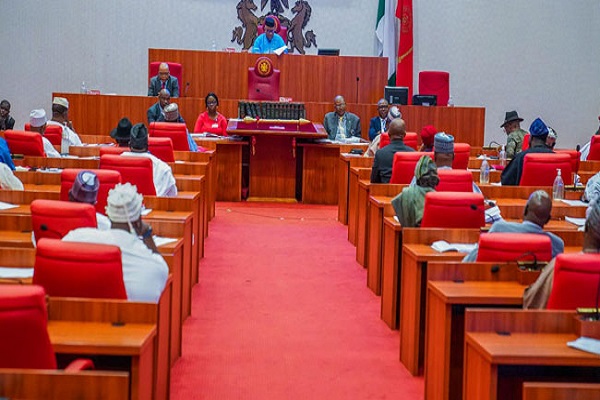
Senate on Thursday, May 9, approved the death penalty for those convicted on the charge of drug trafficking in the country.
The punishment prescribed in the extant NDLEA Act is a maximum sentence of life imprisonment.
The resolution of the Senate followed its consideration of a report of the Committees on Judiciary, Human Rights and Legal Matters and Drugs and Narcotics, National Drug Law Enforcement Agency (NDLEA) Act (Amendment) Bill, 2024.
The Chairman of the Committee on Judiciary, Human Rights & Legal Matters presented the report during plenary, Senator Mohammed Monguno (APC-Borno North).
The bill, which passed its third reading, aims to update the list of dangerous drugs, strengthen the operations of the NDLEA, review penalties, and empower the establishment of laboratories.
Section 11 of the current act prescribes that “any person who, without lawful authority; imports, manufactures, produces, processes, plants or grows the drugs popularly known as cocaine, LSD, heroin or any other similar drugs shall be guilty of an offence and liable on conviction to be sentenced to imprisonment for life” was amended to reflect a stiffer penalty of death.
Although the report did not recommend a death penalty for the offence, during consideration, Senator Ali Ndume moved that the life sentence should be upgraded to the death penalty.
During a clause-by-clause consideration of the Bill, Deputy Senate President Barau Jibrin, who presided over the session, put the amendment on the death penalty to a voice vote and ruled that the “ayes” had it.
But Senator Adams Oshiomhole objected to the ruling, saying that the “nays” had it.
He argued that matters of life and death should not be treated hurriedly, but Barau said it was too late, as he failed to call for division immediately after his ruling.
The bill was subsequently read for the third time and passed by the Senate.
-

 Headline5 days ago
Headline5 days agoSuspend cybersecurity levy– Reps to CBN
-

 Business5 days ago
Business5 days agoNigeria needs over $2bn to revive Ajaokuta Steel Plant, says Minister
-

 Headline3 days ago
Headline3 days agoPrince Harry visits sick Nigerian soldiers in Kaduna
-

 Entertainment3 days ago
Entertainment3 days agoAMVCA Cultural Day: BBNaija’s Neo, Venita win Best Dressed Male, Female
-

 News5 days ago
News5 days agoShan George’s money returned to Zenith Bank account
-

 Metro3 days ago
Metro3 days agoEx-Sports Minister laments after hospital neglected him for hours over N80000 deposit
-

 Headline5 days ago
Headline5 days agoTinubu resumes work after foreign trip

